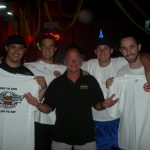On a lazy Saturday afternoon after our awesome interview at Wrigley Field, the PTP team casually strolled up to the highly acclaimed Charlie Trotter’s restaurant in Chicago. Seeing as how this was a restaurant that won the best restaurant in the U.S. in 2000 and was founded in 1987 by celebrity chef Charlie Trotter, we were pretty excited. As we approached the brownstone property we wondered if we were in the right place as the look of the building came off more like a misplaced historic home than a 5-star restaurant, but the gold plated Charlie Trotter “T” displayed amongst the vines climbing the brick wall eased our reservations . We rang the doorbell to the one of the two entrances leading to the restaurant and were given a warm greeting by Matthias Merges in his white chef’s uniform.
 Matthias runs the ship at the innovative and creative Charlie Trotter’s and has been on board for 12 years. As Executive Chef and General Manager, Matthias developed his passion for cooking at the age of 14, where he realized that cooking is hands on and makes you think. He graduated from the Culinary Institute of America at 22, and tried to work at the best possible place he could after that.
Matthias runs the ship at the innovative and creative Charlie Trotter’s and has been on board for 12 years. As Executive Chef and General Manager, Matthias developed his passion for cooking at the age of 14, where he realized that cooking is hands on and makes you think. He graduated from the Culinary Institute of America at 22, and tried to work at the best possible place he could after that.
Originally from New Jersey, he moved to Chicago and soon caught wind of Charlie Trotter’s. Knowing from the beginning that he had to be a part of the elite restaurant and its cuisine, he attempted to just get a “foot in the door.” Without an interview or any prior contact, Matthias went to the back door of the restaurant and pounded on it until someone answered. He told them that if they just let him be a part of the team, and let him work for two weeks without pay, then they could decide if he’s good enough to get paid and be employed. After his passionate pitch, Charlie Trotter’s opened the door to him and Matthias hasn’t looked back since. In his twelve years of working, he has traveled to five continents, over a hundred different cities, and has met a variety of famous chefs from across the globe that have cooked in Charlie Trotter’s kitchen. Matthias has the passion and dedication to excel, and by starting at the lowest spot, he has worked his way up to the top position.
In our interview with Matthias, I was taken aback by the unique philosophy that has separated themselves from a thousand other dining trends that have come and gone, and what has truly been the key to their substantial amounts of success. The philosophy that Matthias told us in a cool, calm, collected manner consisted of creative changes while having a focus on innovation to give customers the greatest dining experience of their life.
There is a quote from Winston Churchill that is displayed in the office of Charlie Trotter that serves as the motto for everyone. “To improve is to change, and to be perfect is to change often.” For nineteen years since the inception of the restaurant, the restaurant has “changed often.” An extreme example of taking this quote to heart is that the restaurant has never replicated a dish, never offering or serving the same thing to a dining customer. According to Merges, 30-40 new dishes have been created every month for the last nineteen years, an amount that equates to approximately 8,000 dishes. One client, a banker from New York that lived in Chicago for awhile, has dined at Charlie Trotter’s over 350 times and has never been served the same dish.
This is the type of creative, challenging atmosphere that you find at Charlie Trotter’s, and the challenge to change doesn’t just stop with the food. Every day employees push themselves to find something new to improve, whether it be folding linens, changing the way the flowers are displayed, or the food.
According to Matthias, “You have to have that mindset. When you get into a groove and you think you’re doing really well and you want to maintain that, you start to become complacent, unimaginative, and things become stale and boring. Change is growth. You cannot grow without change.”
Another differentiating factor that separates themselves from other restaurants is the fact that they compete with themselves, and not against the competition. Whereas other restaurants attempt to take the unique features and trends of competition and try to implement those styles within their own operation, Charlie Trotter’s relies on the creativity of their employees to provide the breakthrough ideas. By competing with themselves, Merges says that “you stay relevant to your vision.”
A way that they do compete is going by the motto, “if it’s fixed, break it.” It all goes back to the concept of never becoming comfortable, and by breaking down the process they find what they can improve on. It’s all about that competition and change that has made Charlie Trotter’s so successful over a nineteen year span.
“The customer is always right” is a saying we’ve all heard, but at Charlie Trotter’s it’s the truth. They want the customer to have the best dining experience possible, and servers will go to any length to enhance this experience. Whether it is an extra bottle of wine, a signed cookbook, or even a free meal for the extremely dissatisfied customers (meals are a flat fee, and can range up to $175 per person), Charlie realizes that it is that extra effort that makes a customers experience memorable and will make a customer want to return.
For us, even though it was just an interview, that extra effort came when we asked for a picture with Matthias for the website. He said, “Well, you can take one with me, or you can take one in the kitchen with the whole team.” So, we followed Matthias into the kitchen where he gathered every cook rushing to prepare for the big Saturday night crowd for a picture. One by one, each cook in their tall white hat and buttoned up uniform came over to where we were and lined up for one, and then two pictures. After that, one of them volunteered to take us around the kitchen for a tour, where we saw chefs (not cooks, because Charlie only trains chefs) preparing bread, vegetables, meat, and deserts for the evening. After the tour of the kitchen, we thought we were done but were asked if we wanted a tour of the premises. Of course!
We got passed off to a young man about our age in a fancy three piece suit that was a host for the evening, and he gave us a wonderful tour of the kitchen where Charlie does his TV show, and of the enormous wine cellars on the bottom floor. They had a wine cellar for reds and whites, and we even got to hold a double barrel vintage red from France produced during World War II in 1945, with an estimated worth of $25,000.
As we finally made our way to the exit, there was a prepared gift bag for us that included a cookbook, two books, and two sauces to be used for our own cooking adventures! The extra effort that they put together to take care of two college guys interviewing was amazing, an was a reflection of what they would do for their customers. Simply put, Charlie Trotter’s is an amazing place and I am quickly filling up my piggy bank for a return trip to really see what they are all about!
Here is some advice and quotations from our interview that Matthias Merges gave to people that want to be a chef, or simply love cooking:
“Don’t forget to include the love. Put your heart on the plate. If you don’t let your heart out into what you’re producing you’ll never have an exceptional product. You’ll have a very good product, possibly a successful product, but not an exceptional one.”
“Find inspiration to cook and create from nature. Music and art are also influences, but mostly nature. Cooking represents what food is from nature, and we are the messengers that take it from here, and transform it into something very simple. You have to know how to treat it, and how to respect it.”
“Once a dish is off the menu, it’s the past. Yesterday is forgotten, tomorrow is an illusion, and today is what really counts. That’s the way to cook. Recipes develop as the food comes in the door. You’re working in the moment. Always.”
“Cooking is like making love. You can either throw it on the fire and forget about it, or you can caress it, touch it, focus on it, and make sure you’re all over it.”
“If you truly love the culinary arts, it doesn’t matter what you get paid. You just try to work at the very best places. Pay is low at first, but it grows exponentially with your talent, work, and dedication.”
“Surround yourself with people that are passionate for what they do, and where you are not the best at what you do. Strive to become the best in that passionate environment.”
“Be your own man. Stick to what you believe, have a great sense of your own morals, become a really great teacher, really great leader. If you can accomplish these tasks, people will follow you anywhere.”
“The staff that comes on board has a large responsibility to the business, and what they bring to the table. But the business has an even larger responsibility to them. How they raise them like a child inside of a business. You teach. The focus needs to be on the concept of family. Because if a business can take care of their employees, the trickle down effect is that they can take care of others because of what they were taught.”
“Stay humble. Remember where you are, and where you came from. You have to know what the bottom is. This gives you a great foundation and gives you a good perspective.”






